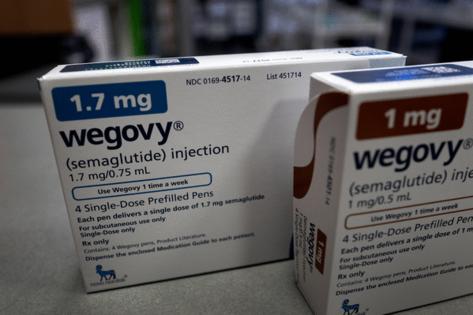UK probes genetic link between obesity drugs and pancreas damage
Published in Health & Fitness
The U.K. is asking patients whose pancreas became dangerously inflamed after taking obesity drugs like Wegovy and Zepbound to come in for tests to understand whether there’s a genetic risk for the condition.
The country’s drug regulator, alongside Genomics England, is investigating whether a person’s genetics might make them more vulnerable to acute pancreatitis — a potential serious side effect of Novo Nordisk A/S and Eli Lilly & Co.’s blockbusters.
In a public announcement, the two agencies called for people who were hospitalized with the condition while taking GLP-1 drugs to report it to a program called the Yellow Card Biobank.
Novo said it continues to collect safety data about its GLP-1 drugs, which include Ozempic for diabetes.
“Patient safety is of the utmost importance,” it said by email. “We recommend that patients take these medications only for their approved indications and under the strict supervision of a health-care professional.”
Lilly said adverse events can be caused by other factors, including pre-existing conditions. The U.S. drugmaker echoed Novo’s comments on safety and talking to a doctor, especially for people who have already had pancreatitis.
Both companies sell two drug versions with the same active ingredient, one for diabetes and the other for obesity.
The pancreas, a long gland tucked behind the stomach, can become inflamed quickly and require urgent medical attention. While most cases improve quickly, some patients can develop complications and even die from the condition.
Making Headlines
“GLP-1 medicines like Ozempic and Wegovy have been making headlines, but like all medicines there can be a risk of serious side effects,” said Matt Brown, chief scientific officer at Genomics England. “We believe there is real potential to minimize these with many adverse reactions having a genetic cause.”
There were 181 reports of acute or chronic pancreatitis in patients taking tirzepatide, the ingredient in Lilly’s Mounjaro and Zepbound, and 113 cases in patients taking semaglutide, sold under the brand names Wegovy and Ozempic, according to data from the regulator’s Yellow Card medical safeguard program.
Five cases were fatal in patients taking the Lilly medicines and one person on the Novo ones died. Reports to the program from patients, health professionals and drugmakers only indicate that a medicine is suspected to have resulted in the adverse reaction, and it doesn’t show causality.
_____
(With assistance from Naomi Kresge and Madison Muller.)
©2025 Bloomberg L.P. Visit bloomberg.com. Distributed by Tribune Content Agency, LLC.










Comments